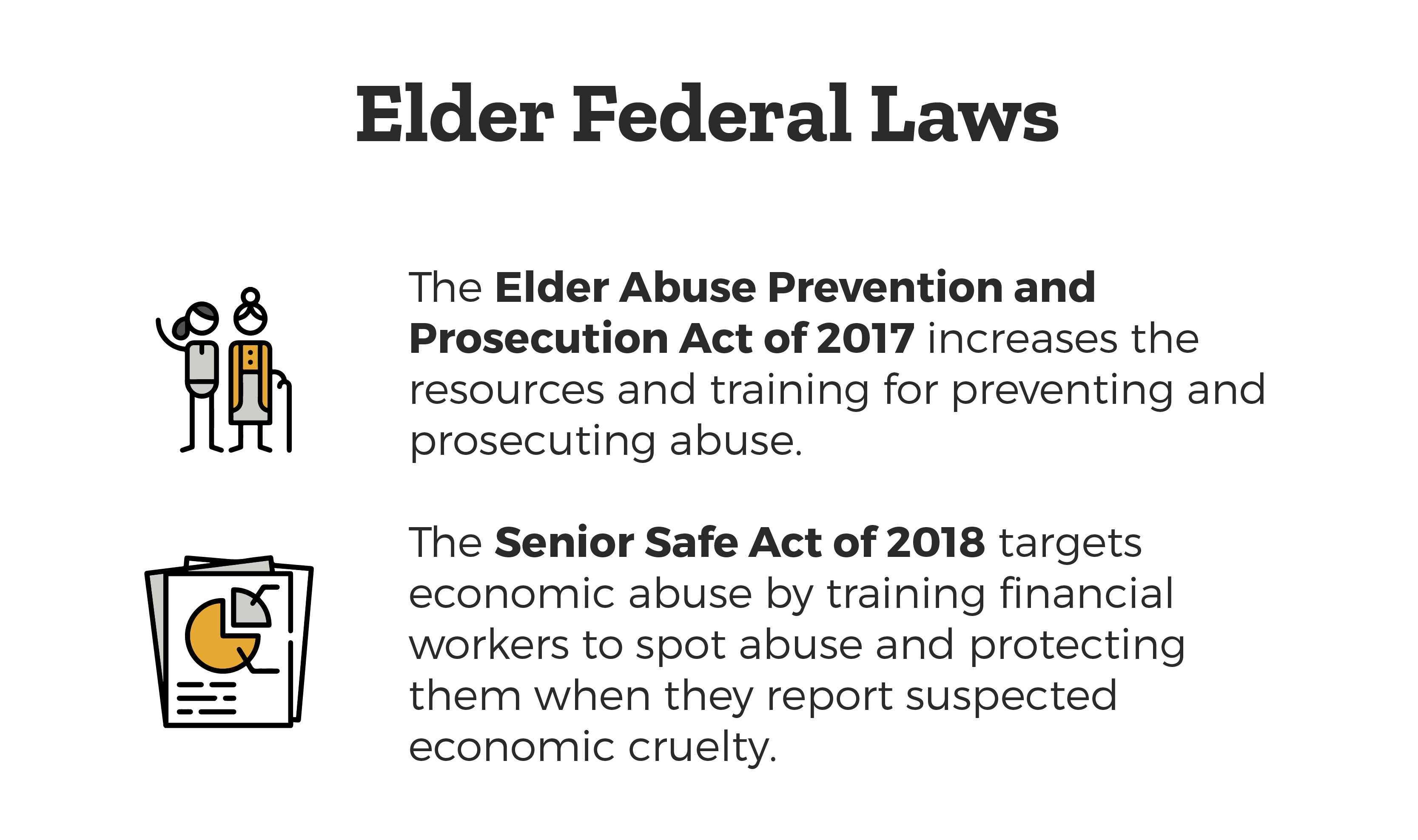Laws Pertaining to Senior Citizens
Americans are living longer than ever before. In fact, the U.S. Census Bureau reports that by 2035, more Americans will be aged 65 and older than younger than 18. As the older population continues to age, seniors and their loved ones will face a number of legal issues. Continue reading for some of the most common issues in elder law.
Social Security
Many seniors rely on government programs to make ends meet. So government benefits are a vital part of elder law.
Most seniors qualify for Social Security retirement benefits. To be eligible, a person must work a certain number of hours. Even those who do not meet the criteria may qualify if they are the spouse or survivor of an eligible person. Seniors with special needs can apply for Social Security disability benefits.
Health Coverage
Health insurance is another key benefit. Medicare provides coverage for seniors who qualify for Social Security retirement benefits. Medicaid provides health insurance to low-income seniors. Although this program is federally funded, each state decides who qualifies. While both programs insure seniors, they cover different things. For instance, California’s Medicaid program – Medi-Cal – covers long-term care such as nursing homes, assisted living programs, and in-home care. By contrast, Medicare generally refuses to pay for anything other than short-term care. Eligible families should include Medicaid planning in their care planning discussions.
Specific Groups
Some seniors may qualify for other programs. Those who have honorably served in the military may receive veterans benefits. Low-income seniors may qualify for help with food, housing, or other needs. The eligibility criteria for government benefits change often, but a skilled elder law attorney can help families identify programs, submit claims, or file appeals.

Employment Law
While many seniors retire, a recent AARP report noted that many people work well into their 70s. While many offices value older workers’ skills, others treat them poorly. Indeed, nearly two-thirds of older employees have reportedly faced age discrimination on the job. Because Americans are living and working longer, older workers need to know their legal rights.
Although age discrimination is a sad reality, several laws protect employees and applicants from bias in hiring, pay, promotion, and other areas. The Age Discrimination in Employment Act of 1967 (ADEA), a federal law, states that employers cannot discriminate against those over the age of 40 when making employment decisions. The law also protects older workers from age-based harassment on the job. In addition to the ADEA, many state laws ban age discrimination. A seasoned attorney can help find the laws that best fit the situation.
Guardianship and Conservatorship
While many people age without losing a step, others develop problems with memory, thinking, or other mental functions. A person with these issues may not be able to make decisions about health care, finances, or other matters. When this happens, loved ones may need to ask the court for guardianship or conservatorship.
In guardianship or conservatorship, a court allows a trusted person to make decisions on behalf of the affected person. Guardianship and conservatorship can be confusing because states often use these similar terms in different ways. For instance, in Virginia, guardianship grants control over nonfinancial matters, while conservatorship grants control over financial affairs. But in California, courts appoint guardians for minors and conservators for adults. No matter the name, in all states, families of those with limited capacity can apply for control over the person’s affairs. Be prepared to tell the court why guardianship or conservatorship is needed. An elder law attorney can help with this process.
Elder Neglect and Abuse
Although most elders receive great care, sadly, some suffer harm at the hands of those responsible for their health and safety. States define senior abuse in many ways, but the Centers for Disease Control and Prevention (CDC) define it as “an intentional act, or failure to act, by a caregiver or another person in a relationship involving an expectation of trust that causes or creates a risk of harm to an older adult.” The abuse can take many forms – neglect, emotional cruelty, economic coercion, physical harm, or even sexual assault. According to the U.S. Department of Justice, at least 1 in 10 seniors will be abused at some point. Even worse, few seniors will report it. Yet, several laws address this issue.
Physical abuse is illegal in all states. Some states punish abuse using existing criminal laws (e.g., assault or battery), while others use laws specifically designed to protect older people. Today, more states are passing laws that address neglect and financial abuse as well as physical abuse.

Although most criminal cases are dealt with at the state level, several federal laws aim to prevent or reduce abuse.
The Elder Abuse Prevention and Prosecution Act of 2017 increases resources and training for preventing and prosecuting abuse.
The Senior Safe Act of 2018 targets economic abuse by training financial workers to spot abuse and protecting them when they report suspected economic cruelty. While these laws cannot end elder neglect or abuse, they show that the nation is taking steps to protect seniors.
End-of-Life Planning
Few people prepare for death. According to NPR, just one-third of U.S. adults engage in end-of-life planning. The thought of death may not be pleasant, but a few documents can help seniors and family members gain peace of mind.
A health care power of attorney protects those who cannot make their own health decisions. The document allows a patient’s representative (the “agent”) to make health care decisions on behalf of the patient (the “principal”). Powers of attorney can be durable or nondurable, but a durable power of attorney is best because it remains in effect even if the person who signs it later becomes incompetent. An attorney can help you draft this simple document.
A living will lets medical staff know whether a patient wants them to take extraordinary measures to preserve life or reject life-saving care after a certain point. Many patients also request a DNR (do not resuscitate) or a DNI (do not intubate) order. These orders tell the medical staff to avoid CPR or tube-assisted breathing even if death results. Although a patient can draft a living will at any time, a DNR or DNI is a medical order that must be signed by a doctor. Each of these forms is legally binding and must be obeyed by medical staff.
Estate Planning and Financial Matters
The estate planning process helps a person decide how their assets and debts will be handled after death. While some think that only those with great wealth or real estate holdings need estate planning, people at all income levels need to make their wishes known. Documents like wills and trusts can ensure that the estate is handled smoothly.
Wills are key estate planning documents. A will states how a person wants their assets and personal items handled after death. The lack of a will creates several issues for those left behind. If a person dies without a will (also known as dying intestate), state law decides who gets what. Most state laws give assets to surviving spouses and children. People outside of these groups – including long-time unmarried partners, grandchildren, and siblings – are often left with nothing. Also, assets issued in the absence of a will are usually taxed at a high rate, which reduces the amount loved ones receive.
A will has other uses as well. A parent can use a will to name a guardian for minor children. Without a will, the court will decide where the children will live. Wills are also a form of asset protection, as they can shield the estate from creditors. For these reasons and many more, a will is a crucial part of the estate process.
Some people choose trusts over wills. Assets given in a will cannot be issued without a court order. This process – known as probate – can take months or years for large estates. A living trust – or trust inter vivos – avoids this. In a revocable living trust, a person creates a trust while they are still alive and places assets into the trust. Upon death, the assets automatically pass to those named in the trust document, avoiding the probate process.
As seniors age, they and their family members may need legal advice on a variety of issues. While bar associations or other groups sometimes host free events, serious legal needs require expert legal services. Elder law is a complex and ever-changing field, so a certified elder law attorney is likely your best option.
